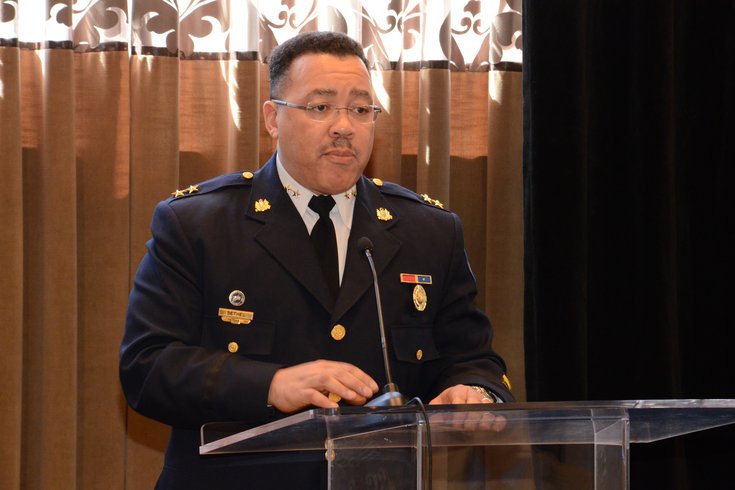
November 04, 2015
 Freedom G Photography/for PhillyVoice
Freedom G Photography/for PhillyVoice
Deputy Commissioner Kevin Bethel at the Delaware Valley Legacy Fund's awards brunch on Sunday, April 12.
Deputy Police Commissioner Kevin Bethel is retiring from the Philadelphia Police Department to focus his efforts on strengthening a pre-arrest diversionary program in the School District of Philadelphia.
The program, spearheaded by Bethel and Philadelphia Police Department, diverts students facing low-level summary and misdemeanor offenses from arrest, instead steering them toward social services aimed at addressing the underlying cause of their behavioral issues.
Bethel will spend his next three years as a Stoneleigh Foundation fellow serving at Drexel University's Juvenile Justice Research and Reform Lab, which has been tasked with evaluating the one-year-old diversionary program.
"I believe there are kids out there [who] need our help," Bethel said. "We never ask them what's going on? We never ask them the question, 'Is there something we can help you with? I think we can make a change in that matter."
The program already has exceeded its three-year goal of decreasing student arrests by 50 percent. Student arrests fell by 54 percent during the 2014-15 school year, the first under the program. Behavior incidents dropped by 17 percent — totaling 1,061 incidents — from the previous year.
Of the 486 students diverted, only six later were arrested in their schools or communities, equating to a minuscule 1.2 percent. Such a rate is "unheard of" in the juvenile justice world, according to Drexel psychology professor Naomi Goldstein, who heads the research and reform lab.
"That's an extraordinarily low rate of future arrests," Goldstein said. "If you think of kids coming out of correctional custody, you see rates of 40 to 70 percent go on to be arrested, depending on the state they're in."
Bethel will work alongside Goldstein in evaluating and expanding the diversionary program, among the first in the country to be implemented on such a wide scale. He hopes the program can serve as a model for schools throughout the nation.
"I believe at this point in my life I have the opportunity to raise the bar around an issue that is often overlooked," Bethel said. "We're really working hard to be a demonstration model."
Philadelphia police partnered with the Philadelphia Department of Human Services and the school district to implement the program in 214 public schools. Various juvenile justice stakeholders, including the District Attorney's Office, also collaborated.
The goal is to keep first-time offenders out of prison, meet their needs and keep them in school, where they can best prepare for a successful future.
"There's been a big push the last few years toward trying to detain and place fewer kids in correctional custody because we know it has such negative outcomes on young people and their futures," Goldstein said. "This is one way of dealing with this issue directly, up-front."
High-level offenses like drug dealing, firearm possession, sexual assault and arson still result in arrest. But many students caught possessing marijuana, fighting, disrupting school, bullying or possessing some items that could be used as weapons instead are entered into the diversion program.
Bethel said students as young as 10 years old previously were getting arrested for offenses as minor as bringing scissors to school.
"At some point, you have to look at the process and ... say that's flat-out wrong," Bethel said. "What human being in his right mind can say a 10-year-old child should be taken out of school, arrested and fingerprinted? That strikes me, and it's been driving my passion for the last two or three years."
The diversionary program saves first-time offenders from arrest, a potentially traumatizing experience for a teenager, and immediately seeks to meet their needs.
Police and social workers from the Department of Human Services meet with the children and their families within 72 hours, offering voluntary social services. They also warn of the consequences of arrest.
About 90 percent of the diverted students accepted voluntary services last year, Goldstein said. If they decline, the students are not arrested.
"These behaviors are so minor," Goldstein said. "They're not hurting people."
The district previously enforced a zero-tolerance policy from 2002 to 2011 that mandated predetermined punishments for various infractions, regardless of the circumstances. Critics claimed such policies did more harm than good, especially for first-time offenders.
A student carrying a small amount of marijuana to cope with grief differs from a drug dealer, Goldstein said. Likewise, a student drawn into a brief fight is different than an aggressor who ruthlessly beats a peer.
"The fact is most of these kids are going to be diverted post-arrest," Goldstein said. "Why do we need to be arresting them at all?"